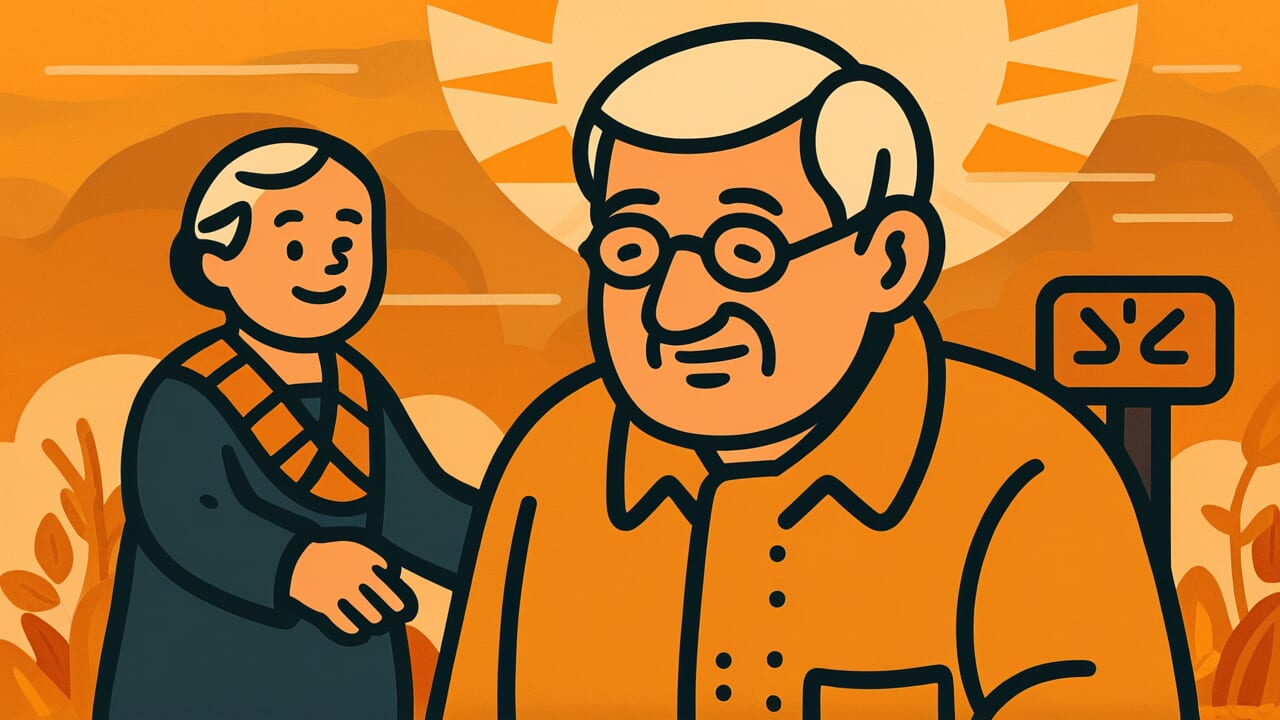How to Read “The autumn sunset and the elderly both decline faster and faster”
Aki no irihi to toshiyori wa, dandan ochime ga hayaku naru
Meaning of “The autumn sunset and the elderly both decline faster and faster”
This proverb talks about how getting old speeds up over time. When people age, their body and energy get weaker faster and faster.
When you’re young, your body changes slowly. But after a certain age, the changes happen much quicker. This is a truth about life that many people experience.
Older people often use this saying when they notice their own decline. They might say it in a joking way about themselves.
Other people use it when they see an elderly person change quickly. Someone might say, “Last year they were so healthy!” with surprise.
This expression works well because it compares aging to something everyone can see. Autumn sunsets get earlier each day, just like how aging speeds up.
Today, as more people live longer, this proverb feels very real. Many families see this pattern in their elderly relatives.
Origin and Etymology
No one knows exactly when this proverb first appeared in writing. But people believe it was common during the Edo period (1603-1868).
The saying shows how Japanese people carefully watch nature. They connected the autumn sunset with human aging in a clever way.
After the autumn equinox, the sun sets earlier each day. In summer, it stays light until after 7 PM. But in autumn, it gets dark by 6 PM, then 5 PM.
This change happens slowly. But suddenly you notice and think, “Wow, it gets dark so early now!”
Japanese people connected this natural pattern to aging. They lived close to nature through farming. They watched the sun’s movement every day.
Comparing human life to nature’s patterns shows their wisdom. They lived with nature and learned from it.
Long ago, people didn’t have modern medicine. Aging was something everyone faced directly. They couldn’t avoid it.
By comparing aging to nature, people made it easier to accept. It wasn’t something to fear, just a natural process like the changing seasons.
Usage Examples
- My father is over 80 now. The autumn sunset and the elderly both decline faster and faster—his legs got weak so quickly in just six months.
- Grandma could shop alone last year. But The autumn sunset and the elderly both decline faster and faster is really true.
Universal Wisdom
This proverb has lasted because it makes aging easier to understand. It compares getting old to something everyone knows—autumn sunsets getting earlier.
Aging happens to everyone, but it’s hard to imagine until you experience it. The speed of change is especially surprising.
When you’re young, you think aging happens steadily. You imagine it as a straight line. But that’s not how it really works.
Actually, aging speeds up at a certain point. The changes get faster and faster. This proverb explains this using autumn sunsets, which everyone has seen.
The proverb also teaches acceptance. Just like no one can stop autumn sunsets from coming earlier, no one can stop aging.
It’s part of nature’s pattern. The proverb shows a calm acceptance of this reality.
At the same time, it warns younger people. Even if you’re healthy now, aging will come someday. You need to prepare for it.
Our ancestors faced aging honestly. They shared this truth with the next generation. This honesty makes the proverb valuable even today.
When AI Hears This
The autumn sunset speeding up is actually about geometry. It’s caused by Earth’s orbit and the tilt of its axis.
After the autumn equinox, the sun sets at an angle. It moves from due west to southwest. This diagonal movement makes the sun drop below the horizon faster.
The change gets bigger each month. September to October, then October to November—the sunset time shifts more and more.
Human aging has the same speeding-up structure. In physics, there’s something called entropy. It means “disorder” or “messiness.”
Entropy increases over time. The important thing is, it doesn’t increase steadily. It speeds up like an exponential curve.
In cells, DNA copying makes mistakes. These mistakes build up. Then the mistakes themselves cause more mistakes. It’s a chain reaction.
Damaged parts become starting points for more damage. The breakdown speed increases by itself.
This “self-accelerating breakdown” is the heart of the proverb. With autumn sunsets, angle changes lead to bigger angle changes.
With aging, damage makes more damage more likely. Both start slow, but after a critical point, they speed up like an avalanche.
Physics teaches us this isn’t just a feeling. It’s a mathematical rule that governs the universe. Things that end speed up as they approach their end.
Lessons for Today
This proverb teaches us about aging. But it also reminds us that this moment right now is precious.
Knowing that decline speeds up isn’t a sad message. Instead, it encourages us to act now. Do what you want while you’re healthy. Spend time with people you love.
For young people, it helps you understand your parents and grandparents. When they change quickly, you might wonder why.
This proverb explains it’s a natural part of aging. It helps you accept these changes without confusion.
It also reminds you to be good to your parents now. Listen to their stories while you can. Don’t wait until it’s too late.
For elderly people, it gives perspective. Feeling yourself decline is hard. But knowing it’s natural makes it easier to accept.
You can focus on what you can still do today. You don’t have to feel too sad about what you’ve lost.
The key is to think about how to live after learning this truth. Time is limited. Your body won’t last forever.
That’s exactly why today matters so much. Living fully right now has incredible value. Make the most of each day you have.



Comments